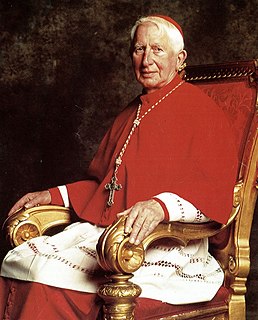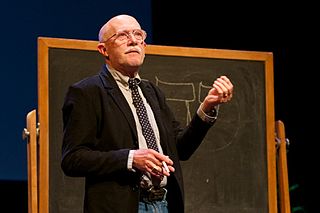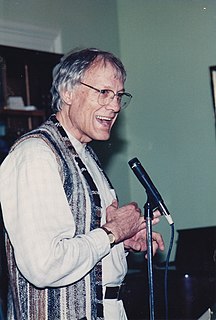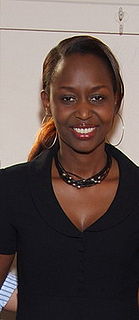A Quote by Basil Hume
We are blind: we cannot see God with our senses, and our deductions from what we know or are thinking about the word of God itself - how little power they have to bring us to God! We are blind, and our eyes need the touch of our Lord's hand to enable us at times to even see dimly.
Related Quotes
Do we not see God at work in our circumstances? Dark times are allowed and come to us through the sovreignty of God. Are we prepared to let God do what He wants with us? Are we prepared to be separated from the outward, evident blessings of God? Until Jesus Christ is truly our Lord, we each have goals of our own which we serve. Our faith is real, but it is not yet permanent. And God is never in a hurry. If we are willing to wait, we will see God pointing out that we have been interested only in his blessings, instead of God Himself.
There are two gods. The god our teachers teach us about, and the God who teaches us. The god about whom people usually talk, and the God who talks to us. The god we learn to fear, and the God who speaks to us of mercy. The god who is somewhere up on high, and the God who is here in our daily lives. The god who demands punishment, and the God who forgives us our trespasses. The god who threatens us with the torments of Hell, and the God who shows us the true path.
There are two gods. A god who casts us off because of our sins, and a God who calls to us with His love.
In our daily lives we attend primarily to that which the senses are spelling out for us: to what the eyes perceive, to what the fingers touch. Reality to us is thinghood , consisting of substances that occupy space; even God is conceived by most of us as a thing. The result of our thinginess is our blindness to all reality that fails to identify itself as a thing, as a matter of fact.
After each failure, ask forgiveness, pick yourself up, and try again. Very often what God first helps us toward is not the virtue itself but just this power of always trying again. For however important chastity (or courage, or truthfulness, or any other virtue) may be, this process trains us in habits of the soul which are more important still. It cures our illusions about ourselves and teaches us to depend on God. We learn, on the one hand, that we cannot trust ourselves even in our best moments, and, on the other, that we need not despair even in our worst, for our failures are forgiven.
We must embrace our differences, even celebrate our diversity. We must glory in the fact that God created each of us as unique human beings. God created us different, but God did not create us for separation. God created us different that we might recognize our need for one another. We must reverence our uniqueness, reverence everything that makes us what we are: our language, our culture, our religious tradition.
Man depends on God for all things: God depends on man for one. Without man's love God does not exist as God, only as creator, and love is the one thing no one, not even God himself, can command. It is a free gift or it is nothing. And it is most itself, most free, when it is offered in spite of suffering, of injustice, and of death . . . The justification of the injustice of the universe is not our blind acceptance of God's inexplicable will, nor our trust in God's love, his dark and incomprehensible love, for us, but our human love, notwithstanding anything, for him.
Christ, in short, asks us to give everything, all our false redemption in the lifeboat, all our false ideas about who God is, all our trust in something other than God to redeem us. In so doing, we die to our broken natures in exchange for His perfect nature, and find unification with Him that will allow God to see us as one.
When we realize a constant enemy of the soul abides within us, what diligence and watchfulness we should have! How woeful is the sloth and negligence then of so many who live blind and asleep to this reality of sin. There is an exceeding efficacy nad power in the indwelling sin of believers, for it constantly inclines itself towards evil. We need to be awake, then, if our hearts would know the ways of God. Our enemy is not only upon us, as it was with Samson, but it is also in us.
"Sabbath is not primarily about us or how it benefits us; it is about God, and how God forms us. It is not, in the first place, about what we do or don't do; it is about God - completing and resting and blessing and sanctifying. These are all things that we don't know much about......But it does mean stopping and being quiet long enough to see - open-mouthed - with wonder - resurrection wonder.....we cultivate the "fear of the Lord". Our souls are formed by what we cannot work up or take charge of. We respond and enter into what the resurrection of Jesus continues to do."
The gift our enemy may be able to bring us: to see aspects of ourselves that we cannot discover any other way than through our enemies. Our friends seldom tell us these things; they are our friends precisely because they are able to overlook or ignore this part of us. The enemy is thus not merely a hurdle to be leaped on the way to God. The enemy can be the way to God. We cannot come to terms with our shadow except through our enemies.
We need to find God, and he cannot be found in noises and restlessness. God is the friend of silence. See how nature-trees, flowers, grass-grow in silence. Is not our mission to give God to those we walk with? Not a dead God, but a living, loving God. The more we receive in silent prayer, the more we can give in active life. We need silence to be able to touch souls. The essential thing is not what we say, but what God says to us and through us. Words that don't give the light of Christ increase the darkness.
...I came to realize that God never shows us something we aren't ready to understand. Instead, He lets us see what we need to see, when we need to see it. He'll wait until our eyes and hearts are open to Him, and then when we're ready. He will plant our feet on the path that's best for us. . . but it's up to us to do the walking.
God pursues us into whatever dark place we've landed and behind whatever locked door holds us in. He holds our unwashed and dirty hands and models how He wants us to pursue each other And He says to ordinary people like me and you that instead of closing our eyes and bowing our heads, sometimes God wants us to keep our eyes open for people in need, do something about it, and bow our whole lives to Him instead.
Why pray? Evidently, God likes to be asked. God certainly does not need our wisdom or our knowledge, nor even the information contained in our prayers ("your Father knows what you need before you ask him"). But by inviting us into the partnership of creation, God also invites us into relationship. God is love, said the apostle John. God does not merely have love or feel love. God is love and cannot not love. As such, God yearns for relationship with the creatures made in his image.
What I feel I can do is help people become aware of how pervasive and extensive the arts are, how they affect each one of us in our daily lives—what kind of [buildings] we live in, what kind of clothes we wear, what we see with our eyes. We are often blind to the beautiful things around us. What I'm mostly concerned about is how often we're blind to our own talent. I think that within each human being there is a creative spirit, and some of us have been fortunate enough to have good teachers and parents who've brought this out and encouraged it, but others haven't.






































